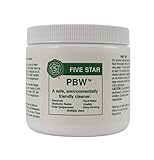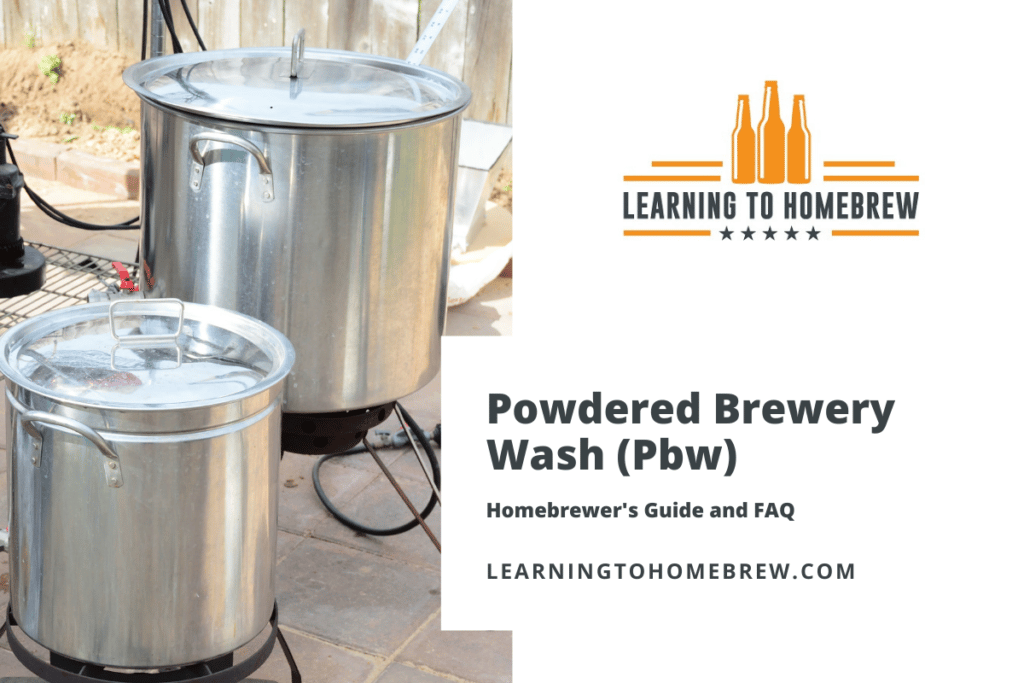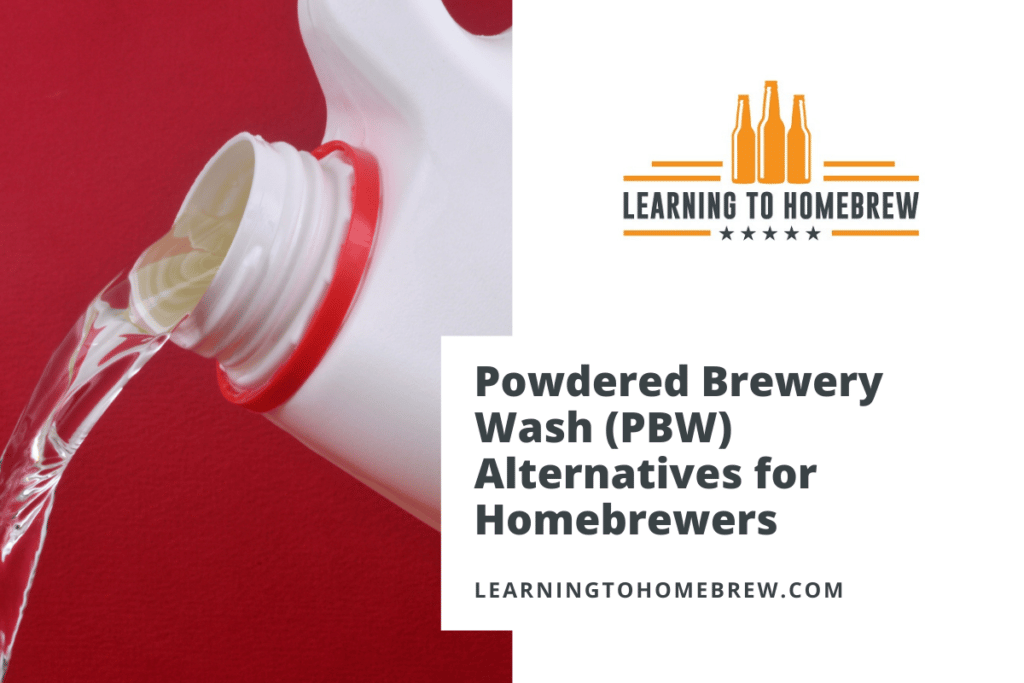There are many products available to clean your homebrewing equipment, so it can be daunting to decide which chemicals are best for you to use. Two industry leaders, PBW and Oxiclean, have their own advantages and drawbacks. So which is a homebrewer to choose?
PBW is a more effective brewing equipment cleaner than OxiClean. PBW is specially formulated to work with brewing equipment and while it may be more expensive than OxiClean, its inclusion of sodium metasilicate makes it a better option for homebrewers.
Continue reading to compare and contrast PBW and OxiClean, learn about their ingredients and uses, and determine which is best for you.
Topics We Cover
Which is better – PBW or OxiClean?
Since PBW was specifically created with the beverage industry’s cleaning needs in mind, it is a better choice for brewing equipment than OxiClean.
OxiClean is missing sodium metasilicate, which effectively cleans organic matter. This is important when considering the trub that is left behind after racking beer. That stuff can be stubborn to completely clean out of your fermentation vessel. Brew kettles can also accumulate wort and hop residue that may not be as easily removed by OxiClean as they would by PBW.
PBW is more expensive than OxiClean, however only a small amount is used during each cleaning, so it will last you quite some time. It can also be used on both stainless steel and aluminum brew kettles, whereas OxiClean will oxidize and darken aluminum. This oxidation will eventually corrode the pot.
Both PBW and OxiClean are detailed below. Keep reading to learn more about how each works and why you may choose one over the other.
| Image | Title | Price | Prime | Buy |
|---|---|---|---|---|
 | Five Star PBW - 1 lbs - Non-Caustic Alkaline Cleaner, White - pbw1 | PrimeEligible | Check the price on Amazon! | |
 | OxiClean Versatile Stain Remover Free, 3 lbs. | PrimeEligible | Check the price on Amazon! |
What is PBW?
PBW stands for Powdered Brewery Wash, and it is specifically formulated for brewing equipment. It was created by Five Star Chemicals, a company that has been servicing breweries, wineries, distilleries, and other beverage-related businesses since 1980.
According to Five Star, PBW is “a non-caustic, non-corrosive, environmentally and worker-friendly, safe to use, alkaline cleaner that has been found to outperform other caustic based cleaners.”
PBW is widely available at homebrew supply stores, online, and occasionally at stores like Walmart and Target.
What are the ingredients of PBW?
PBW contains a variety of ingredients intended to thoroughly clean without being caustic. These ingredients include:
- Sodium carbonate: an alkaline salt frequently used in cleansers and detergents
- Sodium carbonate peroxide: when combined with water, it bleaches and oxidizes
- Tetrasodium iminodisuccinate: a plant-derived rinsing aid and water-softener
- Trisodium dicarboxymethyl alaninate: a stabilizing agent used in detergents
- Sodium metasilicate: effective at removing organic matter
- Polypropylene glycol: a wetting agent, used as lubricant
- Sodium lauryl sulfate: a cleansing and foaming agent frequently found in shampoo
- Dimethicone: a silicone-based smoothing agent
- Sodium hydroxide: Neutralizes acids and is frequently used in cleaners and bleaches.
This transparent ingredient list can be found on Five Star’s website.
Performance
PBW is highly effective at cleaning brewing equipment without causing hard water scaling or leaving behind residues after rinsing.
It can also be used to clean both stainless steel and aluminum brew kettles. In addition, it contains no dyes or fragrances, so it will not lend off-flavors to future batches of beer.
Be sure to follow instructions on PBW’s packaging for best results.
Pros
As PBW was made specifically as a cleaning agent for the beverage industry, there are a number of advantages to using it:
- Environmentally friendly and biodegradable
- Very effective cleaner
- Will not cause hard water scaling on equipment
- Can be used for other household cleaning, like cleaning out a dishwasher or washing machine
- Can be used to clean aluminum pots (will not darken and oxidize the pot)
Cons
PBW has a couple of drawbacks:
- More expensive than other cleaners
- May not be gentle on skin
- Must be rinsed off equipment
- PBW is an alkaline, non-caustic, environmentally and user friendly cleaner
- Cleaner is very effective in removing thick, difficult, and caked-on organic soils
- Safe on skin as well as stainless steel, rubber, soft metals, and on plastics
Prices pulled from the Amazon Product Advertising API on:
Product prices and availability are accurate as of the date/time indicated and are subject to change. Any price and availability information displayed on [relevant Amazon Site(s), as applicable] at the time of purchase will apply to the purchase of this product.
Is OxiClean the same as PBW?
Oxiclean is less alkaline than PBW, so the two are not the same. PBW contains sodium metasilicate, which is used as a detergent booster. Oxiclean does not contain sodium metasilicate, so it is less effective at eradicating organic matter.
What is OxiClean?
If you watched television in the early 2000s, you likely saw Billy Mays selling the benefits of OxiClean, a percarbonate cleaner using the power of oxygen to clean your rugs and any tough stains.
Oxiclean releases sodium carbonate to bind organic or inorganic material to clean them away. According to their website, OxiClean cleans by:
- Breaking down stains
- Emulsifying oils to make them lift off surfaces
- Helping prevent soils in the wash from redepositing on your laundry
As it can be used for a variety of household cleaning, Oxiclean is widely available. It can be found in nearly all grocery or department stores and online.
What are the ingredients of OxiClean?
As they aren’t required to disclose all of their ingredients, much of what makes up Oxiclean is considered a trade secret. However, Oxiclean has many of the same ingredients as PBW, save for the sodium metasilicate.
Their regular formula likely contains fragrances and dyes, not just because it’s largely used as a laundry detergent, but also because Oxiclean has a ‘free’ version that does not contain fragrances or dyes. This implies those ingredients are present in their original formula.
Performance
Oxiclean works well to clean all sorts of surfaces, equipment, and laundry. However, without that sodium metasilicate, it is slightly less effective than PBW at cleaning brewing equipment.
If you’re going to use OxiClean to clean your equipment, look for the fragrance-free version in order to keep off-flavors out of your beer.
Many homebrewers recommend combining 70% OxiClean with 30% TSP/90 (also known as Red Devil) in order to maximize the effectiveness of the OxiClean. TSP/90 adds sodium metasilicate and can be found online or at most hardware stores. It is a heavy-duty cleaner that does not require scrubbing. However, it does not combat hard water scaling for homes with hard water.
Outside of the above recipe, be sure to follow instructions on OxiClean’s packaging for best results.
Pros
There are a few reasons brewers would choose OxiClean over PBW:
- Widely available
- Significantly less expensive
- Biodegradable
- Can be used for other things throughout the home, including cleaning surfaces and laundry
Cons
OxiClean may not be right for every homebrewer, though:
- The fragrance free version may not be as easily found
- Cannot be used on aluminum brew pots
- Can irritate skin
- Must be rinsed off equipment
- Oxygen-based, water-activated formula gets out tough dirt, persistent spots and set-in stains
- Free of any irritating dyes and perfumes
Prices pulled from the Amazon Product Advertising API on:
Product prices and availability are accurate as of the date/time indicated and are subject to change. Any price and availability information displayed on [relevant Amazon Site(s), as applicable] at the time of purchase will apply to the purchase of this product.
For the web story version of this article click here!





